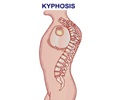A new study suggests that 600,000 Australians suffer from osteoporosis. Concerned experts are suggesting necessary preventive measures.
It is a disease that causes bones to become fragile and weak and increasing the risk of fracture, according to a study by the Australian Institute of Health and Welfare and Osteoporosis Australia.A 'silent' disease, osteoporosis usually shows no signs or symptoms, and so often goes undiagnosed until a fracture occurs.
Osteoporosis affects mostly women and men of middle-age and older.
According to the report, A picture of osteoporosis in Australia, launched by Minister for Ageing, Justine Elliott, at the Princess Alexandra Hospital in Brisbane, 1 in 2 women and 1 in 4 men over the age of 60 will suffer an osteoporotic fracture in their lifetime.
'These fractures may lead to chronic pain, activity restrictions, loss of independence and, sometimes, death,' said Dr Kuldeep Bhatia, Head of the AIHW's National Centre for Monitoring Arthritis and Musculoskeletal Conditions.
Management of osteoporosis includes medication, exercise, physical therapy and healthy eating. About 43 per cent of Australians with osteoporosis take pharmaceuticals and 40 per cent use vitamin/mineral supplements (such as calcium and Vitamin D).
Advertisement
Medical Director of Osteoporosis Australia, Professor Peter Ebeling, said osteoporosis was largely preventable, with key preventive actions being 'a healthy diet, adequate vitamin D levels, regular exercise and not smoking'.
Advertisement
A study by University of Western Sydney researchers last year had found people over 50 who take calcium supplements suffer fewer fractures and enjoy a better quality of life.
Long term daily calcium and Vitamin D supplements have the potential to reduce the risk of fracture in the elderly by almost a quarter, they had said.
“The research provides clear evidence that calcium supplements decrease fracture rates and loss of bone density in older people," lead author Benjamin Tang said.
The positive effect of taking calcium supplements increases with age, particularly for those 70 and older - an age group at high risk of fractures with complications which permanently reduce the quality of life or even cause death.
"Calcium supplements are relatively cheap to dispense, but the impact they have on your health and well being later in life is priceless," said Dr Tang.
Source-Medindia
GPL
Source-Medindia
GPL/M












